Emotional Development
Preschool
- Expresses and labels feelings.
- Controls aggression better.
- Expresses less concern when separated from parents.
- Expresses sense of humor in jokes, nonsense words.
- Learns right from wrong.
- Develops a conscience.
It was theorized that young children conceptualize morality in terms of obedience to adults’ rules and regulations. They know that it makes them good children. This is so because they think in concrete, physical, egocentric ways and their social worlds are dominated by adults (Krebs & Denton, 2005).
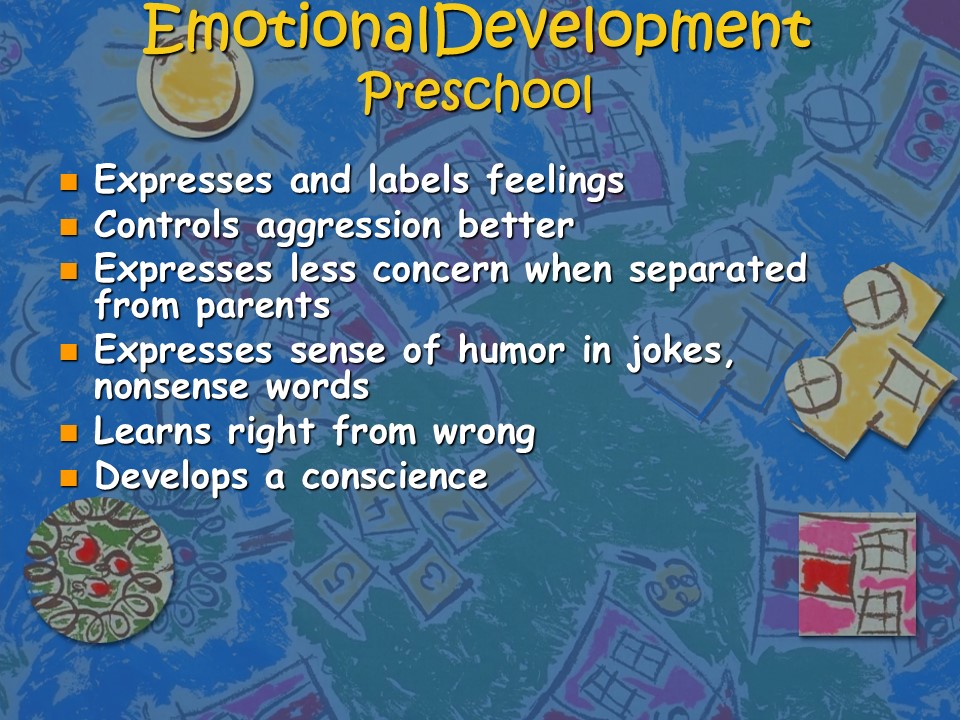
First Grade
- Expresses reactions to others.
- Is sensitive to ridicule and criticism.
- Expresses more worries: war, loss of parents.
- Shows more persistence.
- Expresses more empathy; is able to see others’ viewpoints.
On the other hand, older children think of morality in terms of cooperation with peers because they are cognitively able to comprehend the views of others and already understand concepts such as reciprocity and cooperation because their social worlds consist mainly of interactions with peers (Krebs & Denton, 2005).
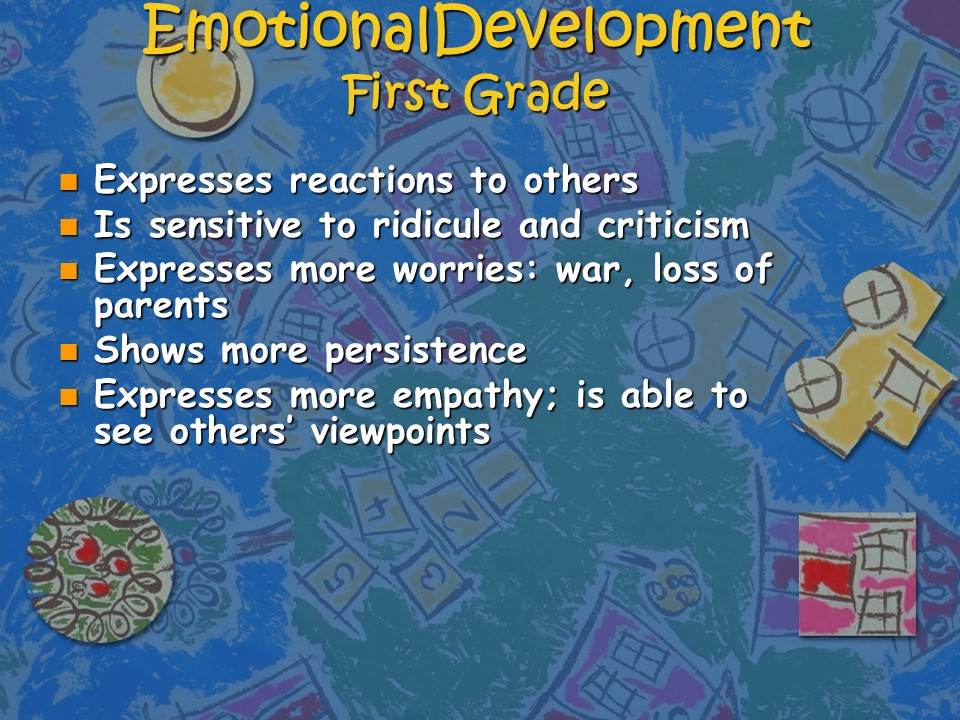
Social Development
Socially, there are children who may be inherently shy or gregarious, as is likewise dictated by their genetic make up or as an effect of exposure to shy or gregarious parents. However, as children get older, they are provided more opportunities to be with other people and learn to deal with different personalities.
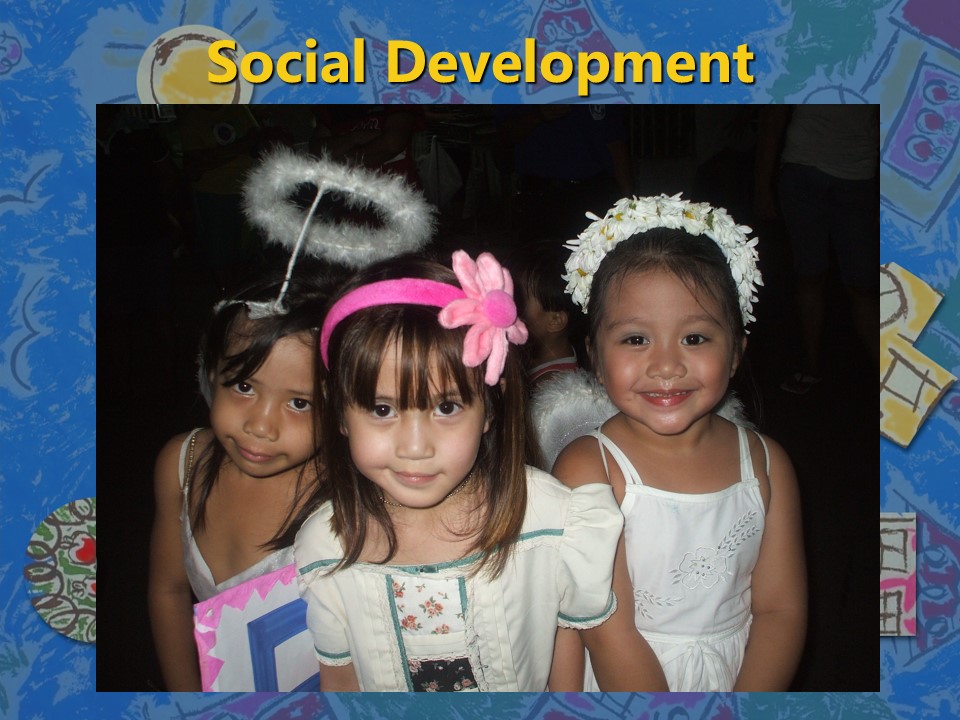
Preschool
- Outgoing; friendly; overly enthusiastic.
- Boasts, exaggerates & “bends” the truth Cooperates with others.
- seeks frequent adult approval.
- Demands doing many things independently.
- Enjoys role-playing and make-believe activities.
- Relies on verbal Name-calling and taunting Establishes close friendships with playmates; beginning to have a “best” friend.
- Takes pride in accomplishments.
Younger children learn to be less egocentric when they start schooling due to the fact that they become exposed to others. However, there are still traces of their being self-centered, as they need to retreat to being by themselves some of the time to regain their own self-disposition.
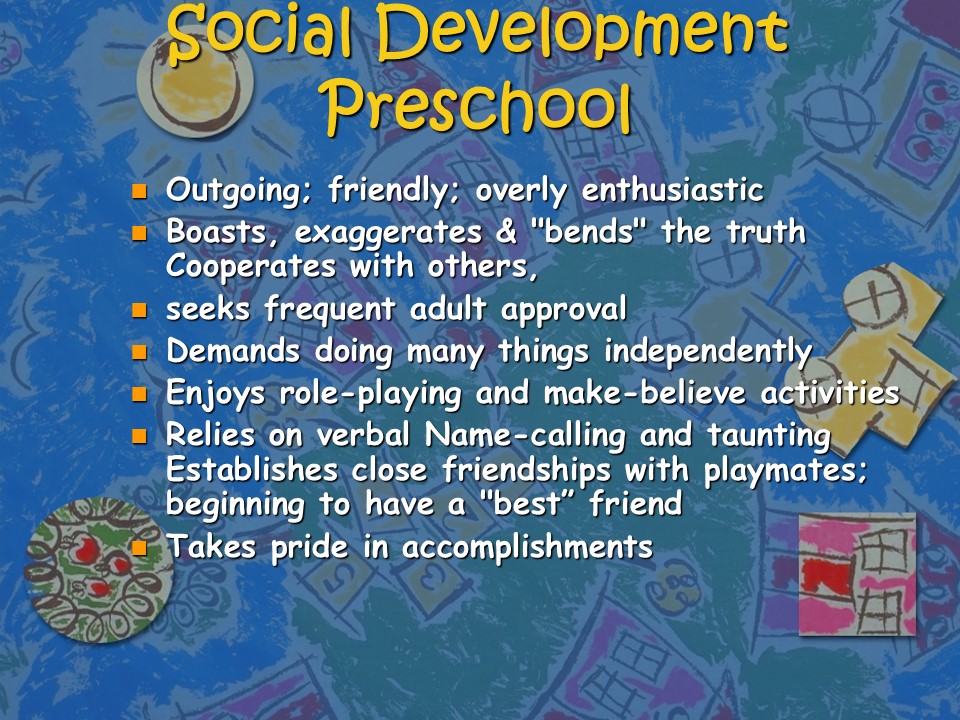
First Grade
- Is more competitive with peers.
- Depends on parents for expansion of interests, activities.
- Is influenced by peer opinions.
- Plays with opposite sex less often.
- Needs teacher approval.
- Is able to share.
- Wants to please.
- Is more independent at work and play.
- Forms more enduring friendships.
- Peer groups begin to form.
Older children value their friends more deeply as they grow. They become more “others-oriented’ not only in seeing what others need and feel, but also how others see them. They become more social beings, being exposed to more variety of people.
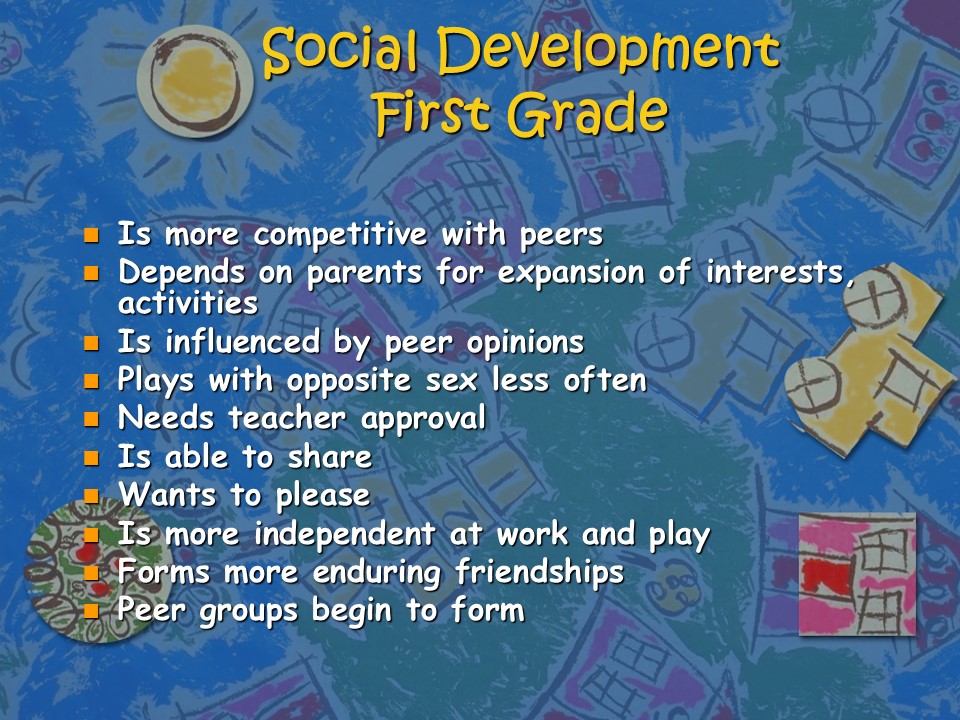
Cognitive Development
Cognitive development involves not only thinking processes but also language skills. As children grow, their thinking processes gain more sophistication. So do their language skills and vocabulary, as they learn to adapt to other people so they become understood better and in turn, to understand others better.
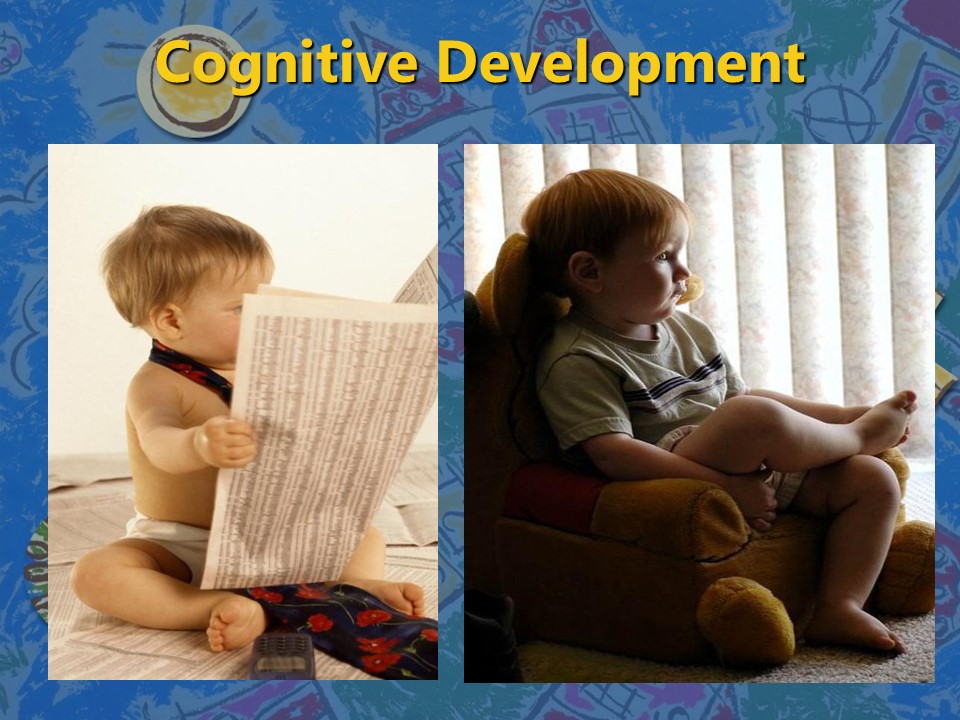
Preschool
- Sorts objects on the basis of both color and form.
- Understands the concepts of smallest and shortest,7 serial position.
- Some children can tell time on the hour. Knows what a calendar is for.
- Vocabulary of 1500 words or more.
- Defines simple words by function.
- Recognizes the humor in simple jokes; makes up jokes; and riddles.
- Produces sentences with an average length of 5 to 7 words.
- Speech is nearly 100% intelligible.
- Uses past tense inflection (-ed) appropriately to mark regular verbs.
- Understands the singular/plural contrast for nouns.
Intelligence is another area where one grows over time. Jean Piaget, among others, has outlined a remarkable framework in the cognitive development of a person and describes each stage. Preschoolers fall under the the Preoperational Period (two to seven years) of Piaget’s Stages of Cognitive Development, which marks the time when a child becomes able to represent objects and knowledge through imitation, symbolic play, drawing, mental images and spoken language. Lack of conservation skills is also characteristic of this stage. “(Brewer, 2001).
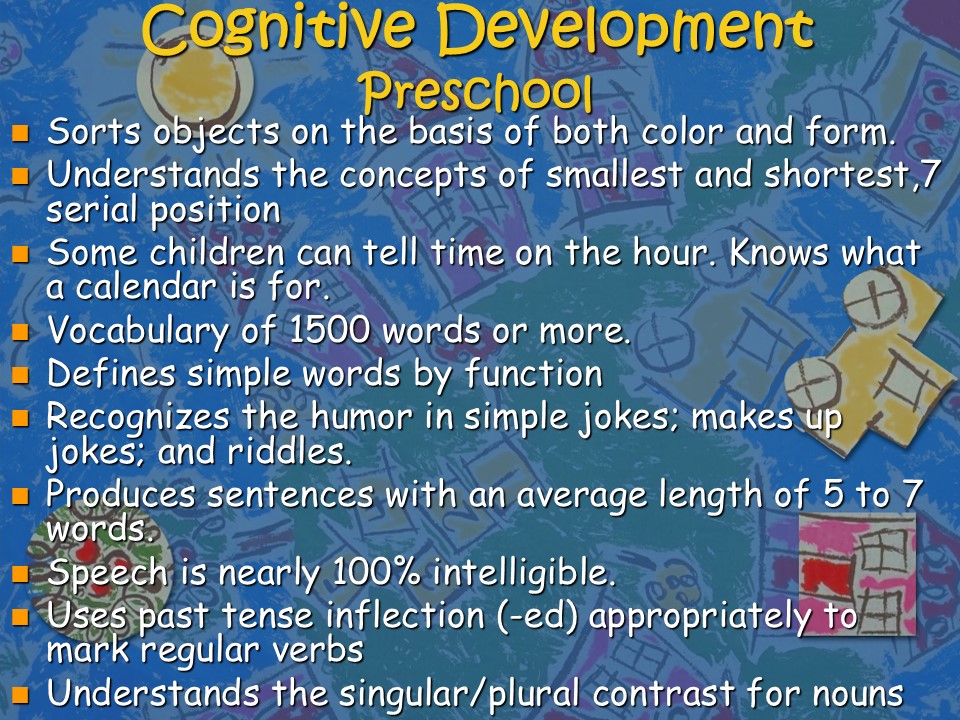
First Grade
- Differences in reading and language abilities widen.
- Transition to concrete operational thinking begins.
- Talking and discussion are important.
- Is able to plan.
- Can sustanin interest over long periods of time.
- Begins to understand cause and effect.
- Develops a growing understanding of time, money.
- Uses slang and profanity.
- Understands and uses more abstract terms.
- Expresses more of awareness of community, world.
First graders fall under Piaget’s Concrete Operational Period. Primary school children at this age begin to think more operationally. Piaget and Inhelder (1969) described the operational thinker as one who employs “identity or reversibility by inversion or reciprocity” (p.99) in solving problems. They have moved on from being egocentric and consider that others may come to conclusions that differ from theirs.
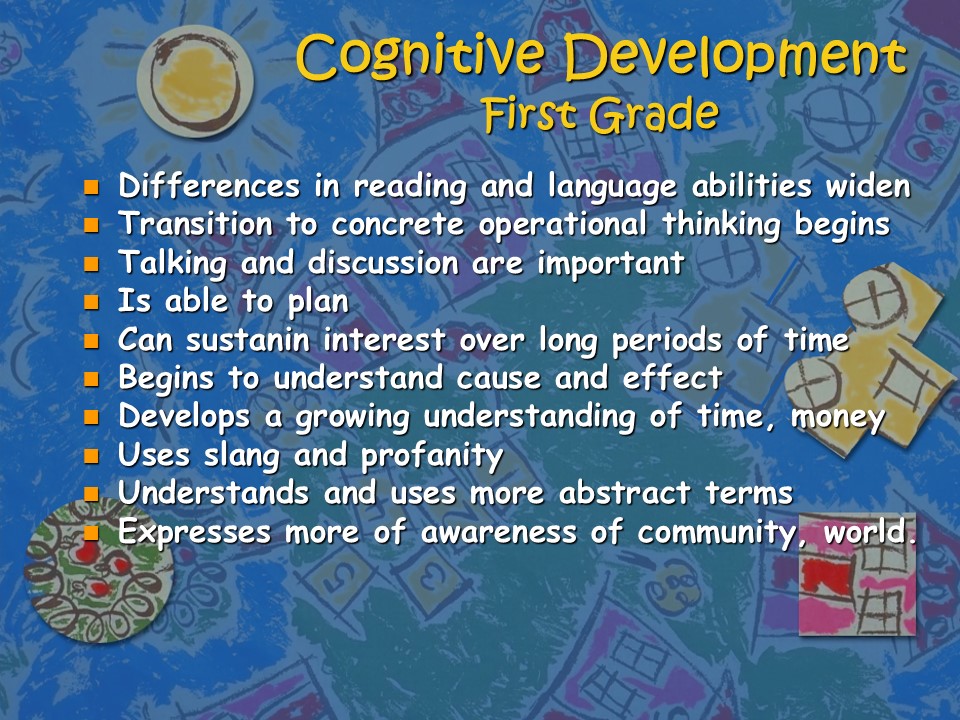
Reading & Writing Development
Schools have been built to nurture and develop it and use a variety of methods to inculcate it in students, just so they may draw upon their literacy skills in becoming productive, learned individuals. Students go through different stages in their reading and writing development.
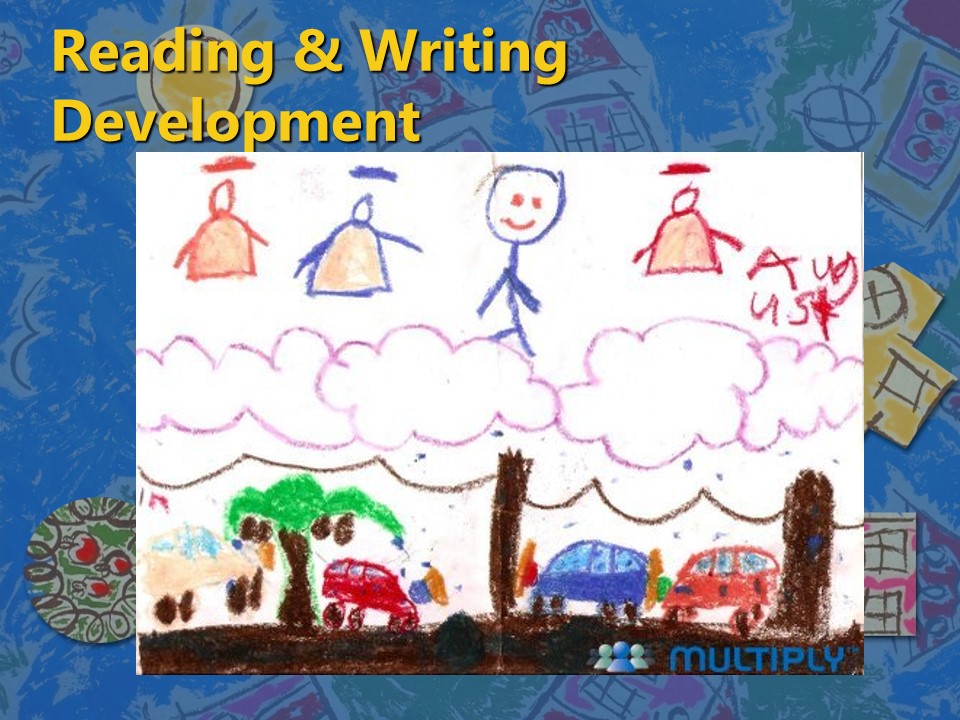
Preschool
Children explore their environment and build the foundations for learning to read and write. Children at this stage can:
- Enjoy listening to and discussing storybooks.
- Understand that print carries a message.
- Engage in reading and writing attempts.
- Identify labels and signs in their environment.
- Participate in rhyming games.
- Identify some letters and make some letter-sound matches.
- Use known letters or approximations of letters to represent written language (especially meaningful words like their name and phrases such as “I love you”).
Preschoolers are just awed with storybooks. Parents and teachers should take time out to read them stories, with engaging storytelling techniques such as using of facial expressions, exaggerated gestures and voice changes. This not only makes the story more captivating, but enlivens the listeners’ imaginations. Comprehension is honed when the story is discussed at length, encouraging children to give their own opinions and insights. It also helps them organize their thoughts as the sequence of the story is discussed. The exploration of writing should be encouraged in preschoolers because this is the time they find association between the spoken word and the printed word, and that people can communicate and express themselves not only in speaking but also in writing.
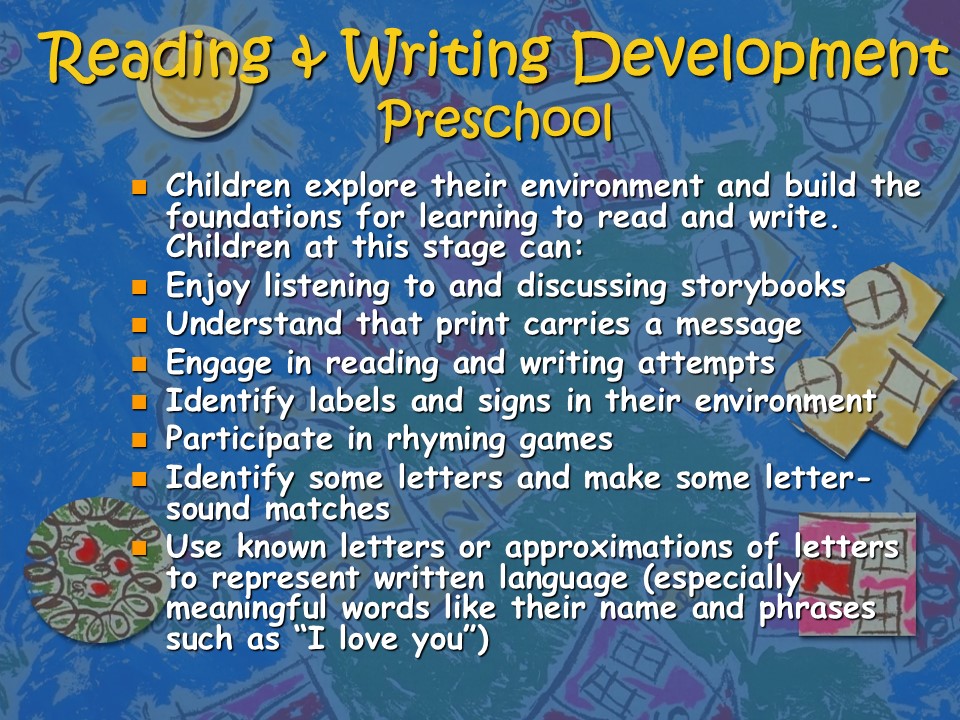
First Grade
- Read and retell familiar stories.
- Use strategies (rereading, predicting, questioning, contextualizing) when comprehension breaks down.
- Use reading and writing for various purposes on their own initiative.
- Orally read with reasonable fluency.
- Use letter-sound associations, word parts and context to identify new words.
- Identify an increasing number of words by sight.
- Sound out and represent all substantial sounds in spelling a word.
- Write about topics that are personally meaningful.
- Attempt to use some punctuation and capitalization.
Teachers of first graders can support them by reading daily to them, transcribing their language and selecting materials that expand children’s knowledge and language development. They need plenty of opportunities for independent reading and writing practice, as they have already acquired the necessary skills for more meaningful and relevant literacy skills. Modeling strategies for identifying unknown words, spelling new words, comprehension cues, etc. is something that may guide them in the right path. Of course, exposure to a range of different text types (poems, informational books, etc.) would hel them build their vocabulary and use these to their advantage in everyday language.
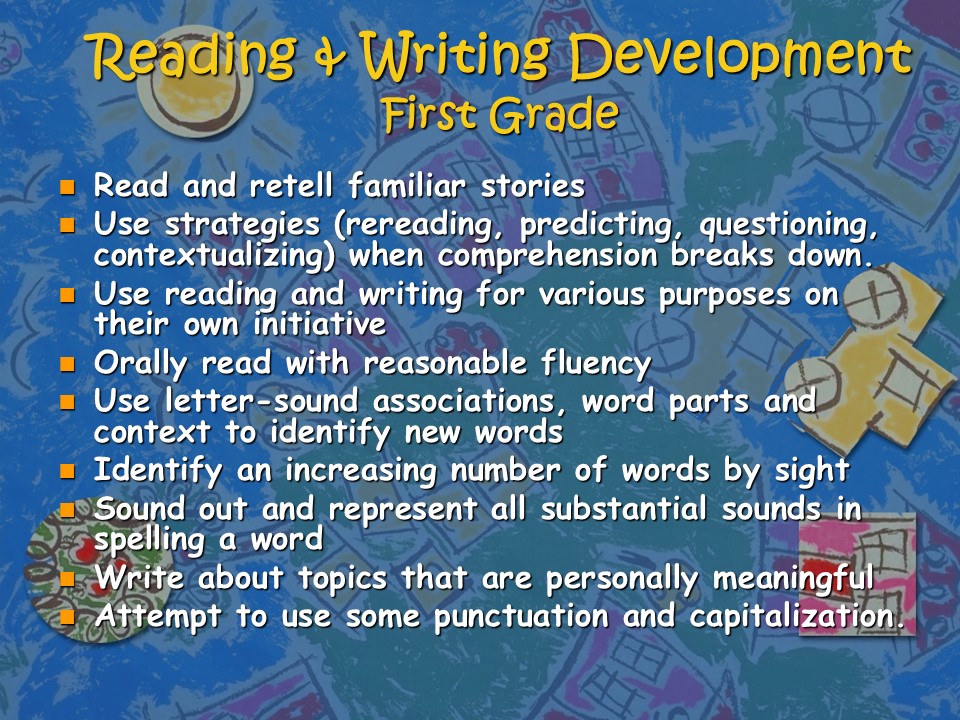
Watch Me Grow!
Knowing how children grow and develop is key to supporting them in the critical period of their development. Many factors affect these different stages, and children highly rely on trusted adults to guide and support them in their life’s journey.
It is one’s privilege to witness and have a hand in molding them as they blossom into the persons they were meant to be. … righteous individuals who possess the character, values and traits to be responsible for tomorrow’s better world.
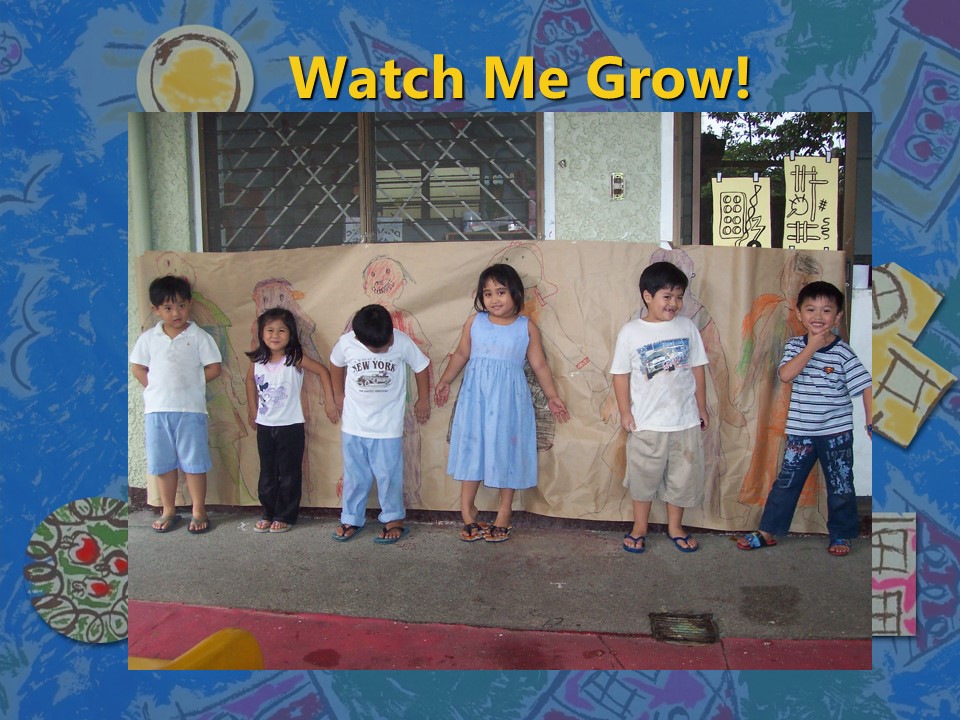
References
Association for Supervision and Curriculum Development (1975) Developmental Characteristics of Children and Youth. Alexandria, VA: ASCD.
Brewer, J. (2001) Introduction to early childhood education. Allyn & Bacon.
Developmental Stages. Web.
International Reading Association/ National Association of Educators of Young Children (IRA/ NAEYC) (1998). Joint Position Statement. “Learning to Read and Write: Developmentally Appropriate Practices for Young Children”, Reading Teacher 52: 200-201.
Kohlberg, L. (1984). Essays in moral development: Vol. 2. The psychology of moral development. New York: Harper & Row.
Krebs, D. L. & Denton, K. (2005), “Toward a More Pragmatic Approach to Morality: A Critical Evaluation of Kohlberg’s Model”, Psychological Review, Vol. 112, No. 3, 629–649.
Piaget, J. & Inhelder, B. (1969) The Psychology of the Child. New York: Basic Books.